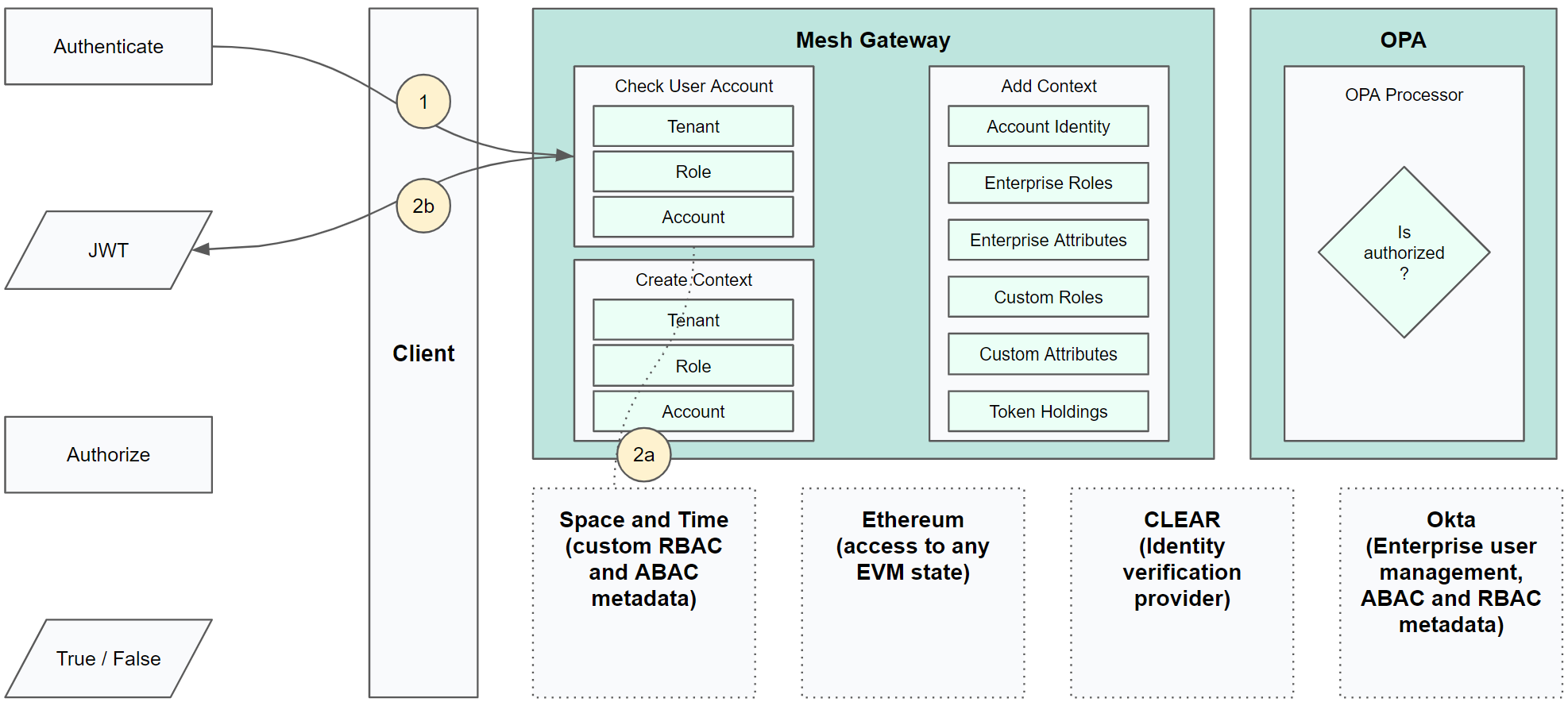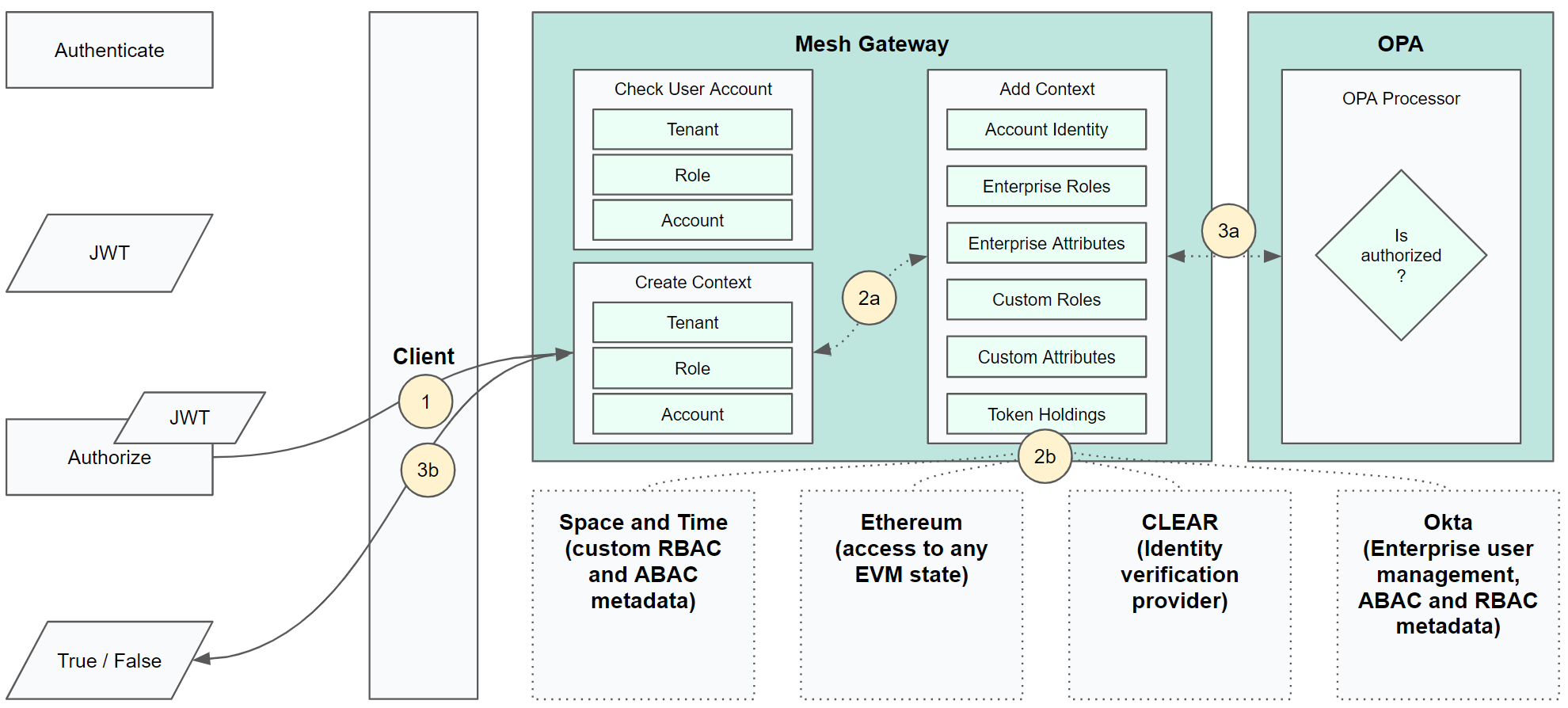Hosting a Mesh Server (Advanced)
This is a minimal implementation for running a local instance of the Mesh Gateway and will require Instruxi to share a registry key to use the Docker image used below. You must reach out to your representative at Instruxi for private, production hosting options.
docker-compose.yml
version: '3.8'
services:
redis:
build:
context: .
ports:
- "6379:6379"
volumes:
- ./data:/data
- ./keys:/keys
environment:
- REDIS_PASSWORD=<passphrase>
gateway:
image: ghcr.io/instruxi-io/gateway:408.0.0
volumes:
- ./app.yml:/layers/golang/app/config/app.yml
- ./.env:/layers/golang/app/.env
ports:
- "8081:8080"
restart: unless-stopped
depends_on:
- redis
.env
BASEURL_GENERAL="https://api.spaceandtime.app/v1" # Space and Time General API Endpoint
BASEURL_DISCOVERY="https://api.spaceandtime.app/v2" # Space and Time Discovery API Endpoint
USERID="<SXT_USER_ID>"
SCHEME="ECDSA"
JOINCODE=""app.yml
port: ":8080"
jwt_expire_in_hr: 24h
s3:
accessKey: ...
secretKey: ...
endpoint: https://gateway.storjshare.io
redis:
uri: redis:6379
password: ...
sxt:
biscuits: []
userId: ...
publicKey: ...
privateKey: ...
namespace: ...
mail:
username: ...
password: ...
host: smtp.gmail.com // deprectated in version 1, moved to Send Grid API
port: 587
tmpl:
activation_prefix: http://localhost:8080/api/v1/enforcer/auth/account/activate
self: http://localhost:8080
clear:
host: https://verified.clearme.com
api_key: sandbox_TEST
secure_host: https://secure.verified.clearme.com
hmac_key: ...
projects:
- id: ...
hex: ...
type: ...
storj:
satellite_address: ...
api_key: ...
opa:
host: http://localhost
port: 9337entrypoint.sh
#!/bin/bash
# Configuration
KEY_NAME="CUSTOM_KEY_NAME"
KEY_TYPE="RSA"
ALG="RS256"
SIZE=2048
USE="sig"
KEYS_DIR="/data/keys"
JWKS_FILE="${KEYS_DIR}/${KEY_NAME}_jwks.json"
# Function to generate keys and JWKS
generate_keys() {
mkdir -p "$KEYS_DIR"
# Generate private key
openssl genrsa -out "${KEYS_DIR}/${KEY_NAME}.pem" $SIZE
# Extract public key
openssl rsa -in "${KEYS_DIR}/${KEY_NAME}.pem" -pubout -out "${KEYS_DIR}/${KEY_NAME}_public.pem"
# Generate key ID (kid) - using a hash of the public key
KID=$(openssl rsa -in "${KEYS_DIR}/${KEY_NAME}_public.pem" -pubin -outform DER | openssl dgst -sha256 -binary | openssl enc -base64 | tr '/+' '_-' | tr -d '=')
# Extract components for JWKS
N=$(openssl rsa -in "${KEYS_DIR}/${KEY_NAME}.pem" -noout -modulus | cut -d'=' -f2 | xxd -r -p | base64 | tr '/+' '_-' | tr -d '=')
E=$(openssl rsa -in "${KEYS_DIR}/${KEY_NAME}.pem" -noout -text | grep "publicExponent:" | awk '{print $2}' | xxd -r -p | base64 | tr '/+' '_-' | tr -d '=')
# Create JWKS JSON
cat > "$JWKS_FILE" << EOF
{
"keys": [
{
"kty": "$KEY_TYPE",
"kid": "$KID",
"use": "$USE",
"alg": "$ALG",
"n": "$N",
"e": "$E"
}
]
}
EOF
echo "Keys and JWKS generated and stored in $KEYS_DIR"
}
# Start Redis server in the background
redis-server --requirepass "$REDIS_PASSWORD" &
# Wait for Redis to be ready
until nc -z localhost 6379
do
echo "Waiting for Redis to be ready..."
sleep 1
done
echo "Redis is ready."
# Generate keys if JWKS doesn't exist
if [ ! -f "$JWKS_FILE" ]; then
echo "Generating new keys and JWKS..."
generate_keys
else
echo "JWKS file already exists."
fi
# Store JWKS in Redis
redis-cli -a "$REDIS_PASSWORD" set jwks "$(cat $JWKS_FILE)"
echo "JWKS stored in Redis"
# Keep the container running
tail -f /dev/nullAuthentication Solution Diagram

Validate Authorization w/ OPA Context

Updated 6 months ago
